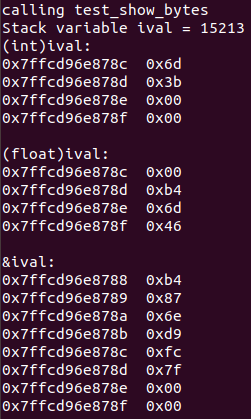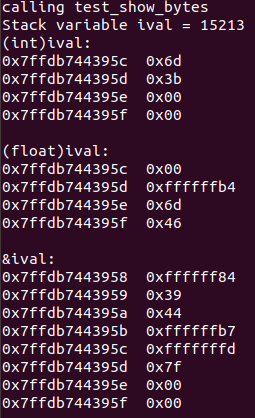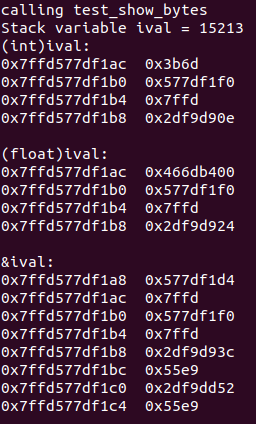代码全览
/* show-bytes - prints byte representation of data */
/* $begin show-bytes */
#include <stdio.h>
/* $end show-bytes */
#include <stdlib.h>
#include <string.h>
/* $begin show-bytes */
typedef unsigned char *byte_pointer;
//typedef char *byte_pointer;
//typedef int *byte_pointer;
void show_bytes(byte_pointer start, size_t len) {
size_t i;
for (i = 0; i < len; i++)
printf("%p\t0x%.2x\n", &start[i], start[i]);
printf("\n");
}
void show_int(int x) {
show_bytes((byte_pointer) &x, sizeof(int));
}
void show_float(float x) {
show_bytes((byte_pointer) &x, sizeof(float));
}
void show_pointer(void *x) {
show_bytes((byte_pointer) &x, sizeof(void *));
}
/* $end show-bytes */
/* $begin test-show-bytes */
void test_show_bytes(int val) {
int ival = val;
//float fval = (float) ival;
double fval = (double) ival;
int *pval = &ival;
printf("Stack variable ival = %d\n", ival);
printf("(int)ival:\n");
show_int(ival);
printf("(float)ival:\n");
show_float(fval);
printf("&ival:\n");
show_pointer(pval);
}
/* $end test-show-bytes */
void simple_show_a() {
/* $begin simple-show-a */
int val = 0x87654321;
byte_pointer valp = (byte_pointer) &val;
show_bytes(valp, 1); /* A. */
show_bytes(valp, 2); /* B. */
show_bytes(valp, 3); /* C. */
/* $end simple-show-a */
}
void simple_show_b() {
/* $begin simple-show-b */
int val = 0x12345678;
byte_pointer valp = (byte_pointer) &val;
show_bytes(valp, 1); /* A. */
show_bytes(valp, 2); /* B. */
show_bytes(valp, 3); /* C. */
/* $end simple-show-b */
}
void float_eg() {
int x = 3490593;
float f = (float) x;
printf("For x = %d\n", x);
show_int(x);
show_float(f);
x = 3510593;
f = (float) x;
printf("For x = %d\n", x);
show_int(x);
show_float(f);
}
void string_ueg() {
/* $begin show-ustring */
const char *s = "ABCDEF";
show_bytes((byte_pointer) s, strlen(s));
/* $end show-ustring */
}
void string_leg() {
/* $begin show-lstring */
const char *s = "abcdef";
show_bytes((byte_pointer) s, strlen(s));
/* $end show-lstring */
}
void show_twocomp()
{
/* $begin show-twocomp */
short x = 12345;
short mx = -x;
show_bytes((byte_pointer) &x, sizeof(short));
show_bytes((byte_pointer) &mx, sizeof(short));
/* $end show-twocomp */
}
int main(int argc, char *argv[])
{
int val = 12345;
if (argc > 1) {
val = strtol(argv[1], NULL, 0);
printf("calling test_show_bytes\n");
test_show_bytes(val);
} else {
printf("calling show_twocomp\n");
show_twocomp();
printf("Calling simple_show_a\n");
simple_show_a();
printf("Calling simple_show_b\n");
simple_show_b();
printf("Calling float_eg\n");
float_eg();
printf("Calling string_ueg\n");
string_ueg();
printf("Calling string_leg\n");
string_leg();
}
return 0;
}
typedef unsigned char* byte_pointer不带参数的运行结果:
calling show_twocomp
0x7ffec6b013a4 0x39
0x7ffec6b013a5 0x30
0x7ffec6b013a6 0xc7
0x7ffec6b013a7 0xcf
Calling simple_show_a
0x7ffec6b0139c 0x21
0x7ffec6b0139c 0x21
0x7ffec6b0139d 0x43
0x7ffec6b0139c 0x21
0x7ffec6b0139d 0x43
0x7ffec6b0139e 0x65
Calling simple_show_b
0x7ffec6b0139c 0x78
0x7ffec6b0139c 0x78
0x7ffec6b0139d 0x56
0x7ffec6b0139c 0x78
0x7ffec6b0139d 0x56
0x7ffec6b0139e 0x34
Calling float_eg
For x = 3490593
0x7ffec6b0137c 0x21
0x7ffec6b0137d 0x43
0x7ffec6b0137e 0x35
0x7ffec6b0137f 0x00
0x7ffec6b0137c 0x84
0x7ffec6b0137d 0x0c
0x7ffec6b0137e 0x55
0x7ffec6b0137f 0x4a
For x = 3510593
0x7ffec6b0137c 0x41
0x7ffec6b0137d 0x91
0x7ffec6b0137e 0x35
0x7ffec6b0137f 0x00
0x7ffec6b0137c 0x04
0x7ffec6b0137d 0x45
0x7ffec6b0137e 0x56
0x7ffec6b0137f 0x4a
Calling string_ueg
0x55e9a92e9d34 0x41
0x55e9a92e9d35 0x42
0x55e9a92e9d36 0x43
0x55e9a92e9d37 0x44
0x55e9a92e9d38 0x45
0x55e9a92e9d39 0x46
Calling string_leg
0x55e9a92e9d3b 0x61
0x55e9a92e9d3c 0x62
0x55e9a92e9d3d 0x63
0x55e9a92e9d3e 0x64
0x55e9a92e9d3f 0x65
0x55e9a92e9d40 0x66
改为 typedef char *byte_pointer 的运行结果:
calling show_twocomp
0x7ffe25b91464 0x39
0x7ffe25b91465 0x30
0x7ffe25b91466 0xffffffc7
0x7ffe25b91467 0xffffffcf
Calling simple_show_a
0x7ffe25b9145c 0x21
0x7ffe25b9145c 0x21
0x7ffe25b9145d 0x43
0x7ffe25b9145c 0x21
0x7ffe25b9145d 0x43
0x7ffe25b9145e 0x65
Calling simple_show_b
0x7ffe25b9145c 0x78
0x7ffe25b9145c 0x78
0x7ffe25b9145d 0x56
0x7ffe25b9145c 0x78
0x7ffe25b9145d 0x56
0x7ffe25b9145e 0x34
Calling float_eg
For x = 3490593
0x7ffe25b9143c 0x21
0x7ffe25b9143d 0x43
0x7ffe25b9143e 0x35
0x7ffe25b9143f 0x00
0x7ffe25b9143c 0xffffff84
0x7ffe25b9143d 0x0c
0x7ffe25b9143e 0x55
0x7ffe25b9143f 0x4a
For x = 3510593
0x7ffe25b9143c 0x41
0x7ffe25b9143d 0xffffff91
0x7ffe25b9143e 0x35
0x7ffe25b9143f 0x00
0x7ffe25b9143c 0x04
0x7ffe25b9143d 0x45
0x7ffe25b9143e 0x56
0x7ffe25b9143f 0x4a
Calling string_ueg
0x56542d245d34 0x41
0x56542d245d35 0x42
0x56542d245d36 0x43
0x56542d245d37 0x44
0x56542d245d38 0x45
0x56542d245d39 0x46
Calling string_leg
0x56542d245d3b 0x61
0x56542d245d3c 0x62
0x56542d245d3d 0x63
0x56542d245d3e 0x64
0x56542d245d3f 0x65
0x56542d245d40 0x66
改为 typedef int *byte_pointer 的运行结果:
calling show_twocomp
0x7fffda172ef4 0xcfc73039
0x7fffda172ef8 0x369ab800
0x7fffda172ef6 0xb800cfc7
0x7fffda172efa 0xe5cd369a
Calling simple_show_a
0x7fffda172eec 0x87654321
0x7fffda172eec 0x87654321
0x7fffda172ef0 0xda172eec
0x7fffda172eec 0x87654321
0x7fffda172ef0 0xda172eec
0x7fffda172ef4 0x7fff
Calling simple_show_b
0x7fffda172eec 0x12345678
0x7fffda172eec 0x12345678
0x7fffda172ef0 0xda172eec
0x7fffda172eec 0x12345678
0x7fffda172ef0 0xda172eec
0x7fffda172ef4 0x7fff
Calling float_eg
For x = 3490593
0x7fffda172ecc 0x354321
0x7fffda172ed0 0xda172f00
0x7fffda172ed4 0x7fff
0x7fffda172ed8 0x43fd0a6c
0x7fffda172ecc 0x4a550c84
0x7fffda172ed0 0xda172f00
0x7fffda172ed4 0x7fff
0x7fffda172ed8 0x43fd0a7c
For x = 3510593
0x7fffda172ecc 0x359141
0x7fffda172ed0 0xda172f00
0x7fffda172ed4 0x7fff
0x7fffda172ed8 0x43fd0aad
0x7fffda172ecc 0x4a564504
0x7fffda172ed0 0xda172f00
0x7fffda172ed4 0x7fff
0x7fffda172ed8 0x43fd0abd
Calling string_ueg
0x55c943fd0d44 0x44434241
0x55c943fd0d48 0x61004645
0x55c943fd0d4c 0x65646362
0x55c943fd0d50 0x61630066
0x55c943fd0d54 0x6e696c6c
0x55c943fd0d58 0x65742067
Calling string_leg
0x55c943fd0d4b 0x64636261
0x55c943fd0d4f 0x63006665
0x55c943fd0d53 0x696c6c61
0x55c943fd0d57 0x7420676e
0x55c943fd0d5b 0x5f747365
0x55c943fd0d5f 0x776f6873
一:头文件:①#include <stdio.h>包含了标准的库函数如输入scanf和输出printf;
②#include <stdlib.h>里面定义了五种类型、一些宏和通用工具函数。 类型例如size_t、wchar_t、div_t、ldiv_t和lldiv_t; 宏例如EXIT_FAILURE、EXIT_SUCCESS、RAND_MAX和MB_CUR_MAX等等;常用的函数如malloc()、calloc()、 realloc()、free()、system()、atoi()、atol()、rand()、srand()、exit()等等;
③#include <string.h>里面包含了strcpy(字符串拷贝)、strcat(字符串连接)、strcmp(比较两个字符串)等函数。
二:typedef unsigned char byte_pointer;:typedef的作用是为数据类型取一个新名字,这里是将unsigned char命名为byte_pointer;
size_t在64位系统下为unsigned long int,通常我们用sizeof()操作得到的就是size_t类型。
三:调用show_bytes时将传入无符号字符对象的指针和该对象的字节数,然后通过for循环的printf("%p\t0x%.2x\n", &start[i], start[i]); 进行格式化输出,以两位16进制数输出,start是对象的首地址,start[i]代表从start[0]开始第i个位置处的字节。
四:int main(int argc, char *argv[])其中第一个参数是记录在命令行输入的字符串个数,第二个参数是存放命令行上的字符串。
五:程序的运行结果还可以看出机器是大端存储还是小端存储方式。
六:关于unsigned char*、char*、int*三种不同指针类型运行结果不同的思考:
unsigned char* 带参数15213的运行结果:

char* 带参数15213的运行结果:

int* 带参数15213的运行结果:

由图一和图二对比:当所表示的字节的值超过了char的表数范围(-128~127)时,byte本无符号的说法,但将byte的值赋给int、long等其它类型时,系统会最高位进行扩展。因此使用符号类型(char),可能会造成数据错误。
由图一和图三对比:由于start被解释成int型,所以 程序每次读取4个字节并以16进制打印,因此造成数据错误。






















 588
588











 被折叠的 条评论
为什么被折叠?
被折叠的 条评论
为什么被折叠?








